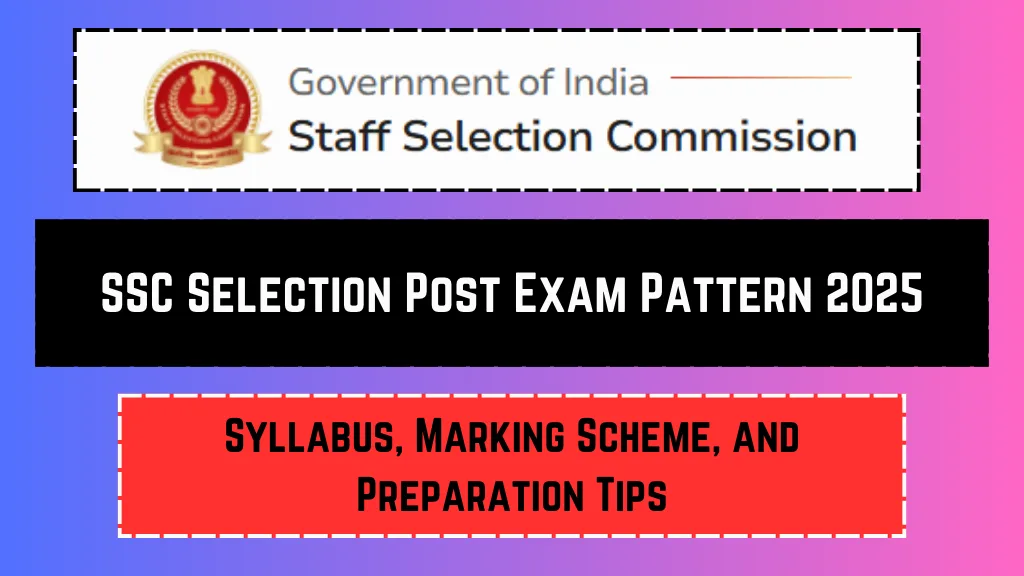The SSC Selection Post Phase 13 exam is one of the most sought-after recruitment drives for candidates with 10th, 12th, or graduation qualifications. If you’re aiming for government jobs like Laboratory Assistant, Deputy Ranger, or Upper Division Clerk (UDC), cracking this exam is your ticket. But first, you need a solid grasp of the exam pattern, syllabus, and preparation strategy.
This guide breaks down everything marking scheme, negative marking, time management, and expert-backed tips so you can ace the exam without last-minute panic.
SSC Selection Post Phase 13 📌
| Key Point | Details |
|---|---|
| Organization Name | Staff Selection Commission (SSC) |
| Exam Name | SSC Selection Post Phase 13 |
| Notification Release Date | 17 April 2025 |
| Application Period | 16 Apr – 15 May 2025 |
| Exam Date | June-July 2025 (Tentative) |
| Total Vacancies (Expected) | 2049+ (Based on previous trends) |
| Eligibility | Matric (10th), Higher Secondary (12th), Graduation |
| Selection Process | CBT → Skill Test (if applicable) → Document Verification |
| Official Website | ssc.gov.in |
SSC Selection Post Exam Pattern 2025 📝
The exam is computer-based (CBT) and varies slightly based on educational level. Here’s the breakdown:
1. Exam Structure
| Section | No. of Qs | Marks | Time Duration |
|---|---|---|---|
| General Intelligence | 25 | 50 | 60 mins (80 mins for scribe users) |
| General Awareness | 25 | 50 | |
| Quantitative Aptitude | 25 | 50 | |
| English Language | 25 | 50 | |
| Total | 100 | 200 |
2. Marking Scheme
- +2 marks for each correct answer ❎
- -0.5 marks for every wrong answer ⚠️
- No penalty for unanswered questions ✅
3. Skill Test (If Applicable)
Some posts (like Data Entry Operator or Typist) require an additional qualifying skill test (typing speed, computer proficiency). This doesn’t add to your final score but is mandatory .
SSC Selection Post Syllabus 2025 📚
The syllabus is divided into 4 sections, with difficulty adjusted for Matric, 12th, and Graduation levels.
1. General Intelligence & Reasoning 🧠
- Matric Level: Non-verbal questions (figure classification, visual memory) .
- Higher Secondary: Verbal + non-verbal (coding, Venn diagrams) .
- Graduation Level: Advanced reasoning (syllogisms, critical thinking) .
2. General Awareness 🌍
Covers:
- Current affairs (sports, awards) 🏆
- Indian Constitution, history, geography 🏛️
- Scientific research, economic policies .
3. Quantitative Aptitude ➗
- Matric: Basic arithmetic (profit/loss, averages) .
- Graduation: Algebra, trigonometry, data interpretation .
4. English Language 📖
- Grammar (active/passive voice)
- Vocabulary (synonyms, idioms)
- Comprehension passages .
Preparation Tips from Toppers & Experts 🎯
1. Study Plan (60-Day Strategy) 🗓️
| Week | Focus Area |
|---|---|
| 1-2 | General Awareness (daily news + static GK) |
| 3-4 | Quantitative Aptitude (practice shortcuts) |
| 5-6 | Mock Tests (analyze weak areas) |
2. Recommended Books 📘
- Arihant’s SSC General Awareness (for GK)
- RS Aggarwal’s Quantitative Aptitude
- Kirans English (grammar & vocabulary)
3. Real-Life Success Story ✨
Rahul, a 2024 qualifier, shared:
“I practiced 10 mock tests weekly and revised GK from monthly magazines. Time management in the exam was key I skipped tough questions first.”
Common Mistakes to Avoid ❌
- Ignoring Negative Marking – Guess only if 50% sure.
- Overlooking Previous Papers – SSC repeats 10-15% questions.
- Last-Minute Cramming – Focus on revision, not new topics.
Final Thoughts
The SSC Selection Post 2025 is your chance to land a stable government job. With smart preparation, time management, and consistent mock tests, you can crack it effortlessly. Bookmark the official website for updates, and start studying today.🚀

